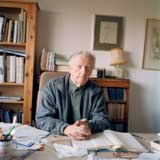BONDS OF ATTACHMENT: EMYR HUMPHREYS AT 100
CENTENARY SYMPOSIUM AND PUBLIC LECTURE
Saturday 13 April 2019
Symposium: 10.00-4.30 at Taliesin Create, Swansea University, Singleton Park, SA2 8PP
Lecture and Reception: 6.00-7.45 at Cinema & Co, 17 Castle St, Swansea SA1 1JF

© Bernard Mitchell
In April 2019, Emyr Humphreys will celebrate his hundredth birthday. He is the pre-eminent novelist of anglophone Wales, a major cultural figure who has operated on several different fronts, and a principled ethical activist. He has enjoyed a career that began when he was talent-spotted and mentored by Graham Greene, continued during the fifties through a creative friendship with Saunders Lewis and pioneering radio and television productions featuring the young Richard Burton, Peter O’Toole and Sian Phillips, diversified further from the early eighties onwards with his seminal contributions of plays and documentaries for the new Welsh-language channel S4C, and culminated with his remarkable late achievements in poetry and in fiction. His has therefore been a unique achievement, one without parallel in the long history of Welsh culture.
CREW (the Centre for Research into the English Literature and Language of Wales), with AWWE (the Association for Welsh Writing in English), is hosting a one-day symposium and evening lecture to assess and celebrate the literary and cultural legacy of Humphreys.
All welcome. Both symposium and public lecture are free, but registration is essential.
A limited number of postgraduate / non-affiliated ECR travel bursaries are available from AWWE. To apply, please email treasurer@awwe.org by 1 April.
Organisers: Kirsti Bohata: k.bohata@swansea.ac.uk and Helen Baldwin h.baldwin@swansea.ac.uk
PROGRAMME
SYMPOSIUM
9.30-10.00 Registration (Tea and Coffee available)
10.00 Welcome
10.20-11.20 SAUNDERS LEWIS MEMORIAL LECTURE
Chair:
M. Wynn Thomas, 'Soul-searches: Marilynne Robinson's Gilead and Emyr Humphreys's Outside the House of Baal.'
11.20-11.40 Coffee / Tea
11.40-12 Launch of the Emyr Humphreys Archive and Book Launch
12-1.15 PANEL 1
Chair:
Michelle Deininger, ‘Emyr Humphreys’ Short Fictions: Landscapes, Communities, Contexts
Daniel G Williams, ‘What’s Wrong with Ancestor Worship? Emyr Humphreys in the 1970s’
1.15-2.00 BUFFET LUNCH
2.00 -3.15 – PANEL 2
Chair:
Elinor Shepley, ‘There was always an unspecified goal. It has turned out to be old age’: Ageing in Emyr Humphreys’s novels and short stories
Andy Webb, ‘Twenty-First Century Humphreys’
3.15-3.45 Tea / Coffee
3.45-4.30 – SESSION 4
Tristan Hughes in conversation with Kirsti Bohata
4.30PM CLOSE - MAKE WAY TO HIGH STREET FOR RECEPTION AND LECTURE AT 6PM
PUBLIC LECTURE (at Cinema and Co)
6.00pm Reception
6.30pm
Candida Clark, ‘A world woven by his voice’; Myth-maker, story-teller, formal innovator and bard: tracing the unique songline of Emyr Humphreys at 100.
Acknowledgements:
CREW wishes to thank the following for their generous financial support: the Learned Society for Wales, the Saunders Lewis Memorial Trust, Swansea University, including the College of Arts and Humanities Research Environment Fund. We are also grateful to the postgraduate travel bursaries offered by our partners, the Association for Welsh Writing in English. Thanks to the Welsh Books Council, the University of Wales Press and Seren Books for the array of books – new and reissued – by and about Emyr Humphreys and the associated publicity material. We are grateful Bernard Mitchell for permission to use his photograph of Emyr Humphreys and to the Richard Burton Archives at Swansea University for their help in planning and organising elements of this event, not least the creation of the new Emyr Humphreys Archive at Swansea University. We are enormously grateful to the Cultural Institute at Swansea University for organising the Public Lecture and to Elaine Canning and Helen Baldwin for sound advice and generous support throughout.
ABSTRACTS and SPEAKER BIOGRAPHIES
'Soul-searches: Marilynne Robinson's Gilead and Emyr Humphreys's Outside the House of Baal.'
Professor M. Wynn Thomas

Abstract:
Marilynne Robinson is one of the most eminent novelists of contemporary America, and was honoured by President Obama with an invitation during his term in office to conduct a public conversation with him at the White House. Her key fiction has been firmly underpinned by her strong moral principles and religious faith, and in this respect it invites comparison with the resonant fiction of Emyr Humphreys.
Biography:
M. Wynn Thomas FBA FLSW OBE is Professor of English and holder of the Emyr Humphreys Chair of Welsh Writing in English at Swansea University. He is the author of over twenty books and his most recent book is a new study of Emyr Humphreys (2018). The record of his thirty-year close friendship with Emyr Humphreys will be preserved in the Emyr Humphreys Archive at Swansea University being formally launched at this symposium.
Emyr Humphreys’ Short Fictions: Landscapes, Communities, Contexts
Dr Michelle Deininger

Biography
Dr Michelle Deininger is Co-ordinating Lecturer in Humanities in the division of Continuing and Professional Education at Cardiff University. She manages the broader adult education humanities provision as well as co-ordinating several open access Pathways to a Degree programmes in English, Creative Writing, Philosophy and Media. She is currently co-writing a book with Dr Claire Flay-Petty (Bridgend College) entitled Scholarship and Sisterhood: Women, Writing and Higher Education for UWP.
‘There was always an unspecified goal. It has turned out to be old age’:
Ageing in Emyr Humphreys’s novels and short stories

Dr Elinor Shepley
Abstract:
Emyr Humphreys has attended to experiences of and attitudes towards ageing in his writing for much of his literary career. One might read the proliferation of older characters to be found in Humphreys’s oeuvre as reflecting the demographic shifts at play in our society since the early twentieth century. Critics have also argued that literary texts are particularly appropriate for rendering the complexities of aged experience and Humphreys’s ability to reveal human frailties and failings with a combination of cutting insight, humour and benevolence is certainly suited to exploring the intricacies of growing older. Studies of novels and short stories about ageing often reveal a concern with the trajectories of older protagonists’ lives. Traditional conceptions of later life characterised by degeneration and loss have been designated ‘decline narratives’ and are usually viewed as problematic due to their involvement in the propagation of ageist attitudes and limiting expectations of later life. Critics have also explored intersections between age and gender and the concept of ‘late style’ – described by Edward Said as ‘a sort of deliberately unproductive productiveness’ – has been applied to the late works of a number of creative writers. This paper will consider a selection of Humphreys’s fictional works with reference to recent critical perspectives on age and ageing in literature.
Biography:
Elinor Shepley recently completed a PhD at Cardiff University. Her thesis examines the representation of ageing in modern and contemporary Welsh fiction in English. Elinor wrote her Masters dissertation on old age in Emyr Humphreys’s fiction, a section of which was published in Almanac: The Yearbook of Welsh Writing in English. She currently works for the Institute of Welsh Affairs.
Twenty-First Century Humphreys

Dr Andy Webb
Biography
Andy Webb is a Senior Lecturer in English Literature at Bangor University and the author of Edward Thomas and World Literary Studies
‘What’s Wrong with Ancestor Worship? Emyr Humphreys in the 1970s’

Professor Daniel G Williams
Abstract
The 1970s in Wales witnessed successful strikes by miners in 1972 and 1974, and considerable vitality in Welsh language culture as manifested in politics and in popular music. Yet much of the decade’s writing dwells on themes of loss, despair and melancholia. The fact that a remarkably vibrant decade in politics, sport and culture gives rise to a literature of nostalgia, loss and grief needs explaining. Was the debacle of the 1979 referendum foreseen in the decade’s novels? This is a question that I will try to address with reference to Emyr Humphreys’ writings.
Biography
Daniel G. Williams is Professor of English and Director of the Richard Burton Centre for the Study of Wales at Swansea University. His latest book is Wales Unchained: Literature. Politics and Identity in the American Century (2015).
Tristan Hughes

Tristan Hughes was born in Atikokan in northern Ontario and brought up on the Welsh island of Anglesey. He is the author of four novels, Send My Cold Bones Home, Revenant, Eye Lake and Hummingbird - which won the Edward Stanford Award for Fiction with a Sense of Place and the Wales Book of the Year People's Choice Prize - as well as a collection of linked short stories, The Tower. His short fiction has appeared in various journals, including Ploughshares, The Southern Review, and New Welsh Review. He is a winner of the Rhys Davies short story prize and the recipient of an O. Henry Award. He currently teaches creative writing at Cardiff University.
‘A world woven by his voice’; Myth-maker, story-teller, formal innovator and bard: tracing the unique songline of Emyr Humphreys at 100.

Candida Clark
Candida Clark is the author of six novels, including The Mariner’s Star, and A House of Light. Described by Paul Theroux as ‘one of the most gifted novelists of her generation,’ she has published short stories, poetry and criticism, and lives on Anglesey and in the New Forest.

